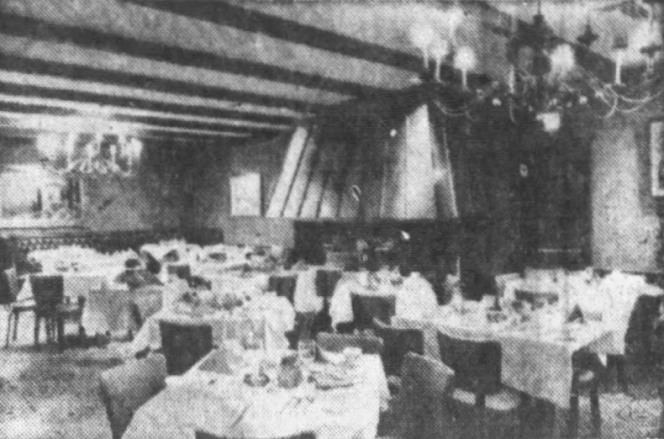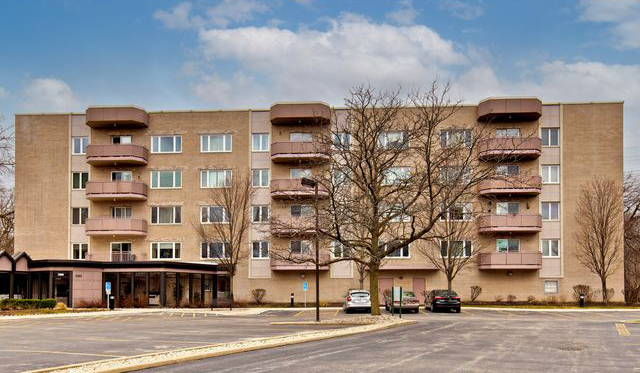The Morton House, formerly the "St. Cloud House" at Miller's Mill, had been thoroughly renovated and refurnished in 1869. They offered room and board for $5 per week and $6 for suites. The area attracted Roadhouses, pickle farms, and rose gardens.
The Morton House opened in October 1869 as a stagecoach stop and saloon (grocery). The Chicago, Milwaukee, and St. Paul Railroad track was laid through what would become the Village of Morton Grove in 1872. The whistle-stop (later station) at what had been Miller's Mill was named Morton Grove to honor one of the railroad's New York financiers, Levi Parsons Morton, who became the 22nd Vice President of the United States from 1889 to 1893 for President Benjamin Harrison. Morton Grove became well-known as a stagecoach stop. The village was formally incorporated as Morton Grove on December 24, 1895.
The little frame building grew with the railroad, adding more rooms. It had become a tradition with the Morton House (on today's Lincoln Avenue at Lehigh, just south of Dempster) that when the Milwaukee Road train would approach the crossing near the restaurant, the bartender would rush out with his lantern, signal the train to a stop and serve the engineer a beer. The practice continued for years until modern high-speed trains made it impossible.
 |
| In the U.S., during the 17th to 20th centuries, Saloons, Ordinaries, Taverns, Groceries, Public Houses (Pubs), Doggeries and Hotel Bars would issue tokens that could be used in payment for future drinks. |
sidebar
How tokens worked. When buying a round of drinks for friends, the bartender would give a token to those patrons already having a drink and collect the full sum from the round-buyer. The owner would collect the money immediately, and the drinkers would have a token for later use. The token cost less to produce than the value of the drink, and there was a significant profit to the bar owner. Sometimes, people would take the tokens home and forget to bring them back, which was pure profit. This is why saloon owners loved tokens. They were found in virtually every drinking establishment.Tokens were also used as change when the price of a drink was odd. For example, in the frontier, drinks were two for a bit (25¢) or (12½¢) for one drink. Thus, tokens exist in one-bit denominations. Early tokens were usually made of brass or tin.
It has been an Inn, a country store, and an ice cream parlor through the years. In 1936, it was purchased by Emil and Otis Dohl and converted into a popular family-type restaurant serving German and American Fare.
The original frame house, a landmark in the northwest suburban community for over half a century, burned down in 1953. It was rebuilt and enlarged, opening on December 4, 1954.
The dining rooms just go on and on. 3 rooms seat about 25 people, each on the main floor. These could be closed into smaller spaces or opened to accommodate a large crown. They were entirely private for parties. Downstairs was the warm and attractive Anchorage room with a bar accommodating 125 persons. The main dining room could seat 275 diners.
 |
| Dohl's Morton House |
 |
| Dohl's Morton House |
 |
| Dohl's Morton House |
When the Dohl family retired in 1968, the Morton House was sold to Ray Castro and Edison Dick, and considerable remodeling was done. They left the name of the restaurant, "The Morton House."
In April of 1970, Dohl's Morton House was acquired by the famous Jacques French Restaurant, 900 N Michigan Avenue, Chicago. They kept the Dohl name.
In June 1972, the Hoffman Brothers, Kenneth & Howard, lifetime residents of Morton Grove, purchased the restaurant. In 1975, Hoffman's remodeled the restaurant. Incidentally, as a Morton Grove fireman, Howard Hoffman was one of the men who fought the Morton House fire in 1953.
Hoffman's Morton House became famous for its tableside Chateaubriand service.
The 1973–1975 recession differed from many previous recessions where high unemployment and high inflation existed simultaneously and took about 5 years to recover. Restaurant operators began cutting corners to try to keep prices down. It was soup or salad at the Morton House, not soup and salad.
Hoffman's Morton House hosted the Fourth Annual Morton Grove Oktoberfest on September 17, 18, 19, 24, 25, and 26, 1976. The flexible walls of a giant tent adjoining Hoffman's Morton House will shake with the nightly musical performances, Yodelers, sing-alongs, dancing, and more.
Howard Hoffman died at St. Francis Hospital in Evanston on July 17, 1985.
The restaurant property was sold, and the equipment and fixtures were auctioned off on March 7, 1991. It's the end of a 122-year legacy.
The Grand Opening of the new Morton House Condominiums happened on January 02, 1993. For $161,900 to $189,900 ($393.000 in 2023), you get a 2 bedroom, 2 bath, in-unit laundry, elevators, and heated parking.
Compiled by Dr. Neil Gale, Ph.D.
On Sunday, March 12, 2023, I received this email with a picture regarding the Morton House Restaurant:
I just wanted to let you know that I really enjoyed reading your March 28, 2021, article about "The History of the Morton House Restaurant that was in Morton Grove, Illinois."My great-great-grandfather was Frank Navroth, who immigrated from Germany around 1879 and settled in Cook County, Illinois. I was researching my family tree and only had a note that said Frank Navroth had opened a pub.I came across the Friday, June 3, 1921 edition of The Daily Herald (Arlington Heights, Illinois) that mentioned Mrs. Fred Egloff, who was formerly Miss Navroth from Morton Grove and whose father conducted the business, now the Morton House. With this bit of information, I was able to locate your article.I recently came across another distant cousin who shared the attached picture of the Morton House, which shows Frank Navroth, second from the right holding up a beer stein. In the background on the right, you can see part of a painted sign that read: "Frank Navroths Grove"
 |
| Julia (Kluge) Navroth is holding a baby in front of the open door. Cecilia (Navroth) Egloff stands next to Julia on her left. Kate (Navroth) Ruitno stands on the right next to the group of children. |
C. Peppel













